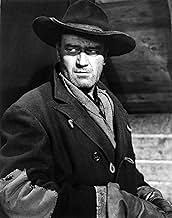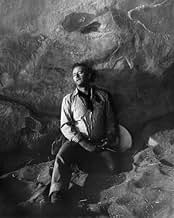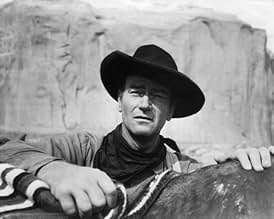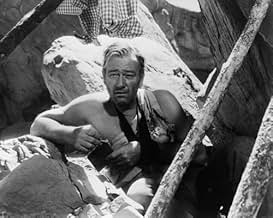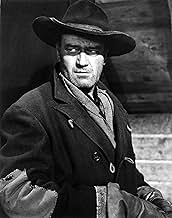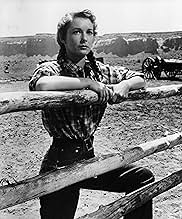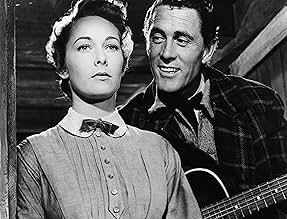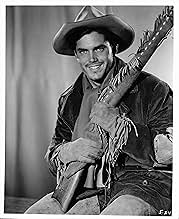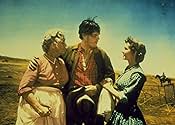Un veterano de la guerra civil estadounidense se embarca en un viaje de años para rescatar a su sobrina de los comanches después de que el resto de la familia de su hermano sea masacrada en ... Leer todoUn veterano de la guerra civil estadounidense se embarca en un viaje de años para rescatar a su sobrina de los comanches después de que el resto de la familia de su hermano sea masacrada en un asalto a su granja de Texas.Un veterano de la guerra civil estadounidense se embarca en un viaje de años para rescatar a su sobrina de los comanches después de que el resto de la familia de su hermano sea masacrada en un asalto a su granja de Texas.
- Premios
- 4 premios y 4 nominaciones en total
Patrick Wayne
- Lt. Greenhill
- (as Pat Wayne)
Argumento
¿Sabías que...?
- CuriosidadesConsidering the part of Ethan Edwards to be the best character that he ever portrayed on-screen and Centauros del desierto (1956) to be his favorite film role, John Wayne named his youngest son Ethan Wayne in homage.
- PifiasThe "dead" Indian under the rock, when the rock is removed, is clearly breathing.
- Créditos adicionalesThe credits state this Warner Brothers film is in VistaVision; this may be the only Warner film in VistaVision.
- ConexionesEdited into Histoire(s) du cinéma: Fatale beauté (1994)
- Banda sonoraThe Searchers (Main Theme)
Composed by Max Steiner
Lyrics by Stan Jones
Sung by Sons of the Pioneers (uncredited)
Reseña destacada
John Ford is a classic Western filmmaker (though certainly not the only genre in which he excelled), employing the classic Western film star, John Wayne, in perhaps one of the most underappreciated films of our time. Ford builds a thoroughly entertaining movie which explores classic Western themes without necessarily relying on these themes to drive the plot.
Like any good Western, we are inorexably drawn to a kind of Cowboys vs. Indians saga, but Ford manages to draw us into the conflict in such a way that the mere "Cowboys good, Indians bad" aesthetic isn't really applicable here. While relying on the archetypical roles of the two groups to set up a conflict, Ford is ahead of his time in managing to characterize the Indians as more than "noble savages". Wayne's character's (Ethan Edwards) hatred of "the Commanch" is called into question a number of times, especially in his stormy relationship with adopted nephew and fellow searcher Martin Pawley (Jeffrey Hunter), who we are told is a quarter-Indian himself, and cannot bring himself to find the same sort of hatred for the Indians that Ethan holds.
Ethan was a Confederate soldier in the Civil War, returning to his brother's Texas homestead after the war. A group of Commanches, led by the ominous Chief Scar, route and kill his brother's family while Ethan and Martin are investigating a cattle rustling, the Commaches' diversionary tactic. The Indians took the family's youngest daughter, and the majority of the film has us following Ethan and Martin in their attempts to track down Scar and take back the girl, Debbie (played by Lorna and Natalie Wood, at different times).
Such a situation sets up one of the many moral ambiguities that make this more than an ordinary Western: the Commanches slaughtered Ethan's brother and his family - he seemingly has reason to hate them with the almost crazy passion that he does. Yet the more naive Martin cannot bring himself to hate them in such a way, and the split between them becomes a major point of contention when it becomes clear that Debbie has more or less been adopted as a Commanche (the two "Searchers" chase after her for about five years in film time). Furthermore, when the two "Searchers" actually meet Scar, who they've been chasing for years, he is presented as a rather intelligent character, although certainly one filled with vengance - he, too, has his reasons for waging war with the likes of Ethan and Martin, and cannot merely be written off a the type of bloodthirsty savage that is typical of the portrayal of most Indians within the genre.
The film relies on enough classic Western material to imbue with the feel with the sense of such pictures. Aside from the question of Ethan's morality, Wayne plays him with classic John Wayne freewheeling confidence and swagger that made the actor such an icon, and it comes off quite well. We are also given a side story involving Martin's romance with the hard-as-nails Laurie Jurgensen (played by Vera Miles, best known for playing Janet Leigh's sister in "Psycho"). The relationship is from a classic, archetypical Western mold - the two have been in love since they were kids, but Martin has responsibilites to his family that stop him from making the proper time for his beau, and his rough frontier-uprbringing leave him seemingly lacking the proper sensitivity for dealing with Laura (though he does, of course, have a heart of gold).
As a side note, this film should prove immensely interesting to any serious fan of the "Star Wars" trilogy (the original one). While those films undoubtably draw a great deal of inspiration from Kurosawa's samurai films, there is most certainly a great deal (especially in the film subtitled "A New Hope") drawn from here. One scene in particular (when Luke returns to his farm after stormtroopers have blasted in pieces) is virtually ripped straight from "The Searchers". Ford's film is also full of the sort of gallows humor present throughout the trilogy, and even incorporates some rather goofy characters, the half-cracked Mose Harper (Hank Warden) and the incredibly over-the-top rival for Laura's hand Charlie McCorry (Ken Curtis), without ruining the overall serious feel of the film, but managing to squeeze laughs out of absurd situations (such as a fight between Martin and Charlie) without compromising the ability to quickly return to a solemn tone. Such deft touch, as well as the addition of wise-cracking dialogue (provided largely by Wayne and Ward Bond here) are a large part of what made the original trilogy so successful, and it's strikingly similar to the type of paradigm on display between various characters here.
Regardless of ranting and raving about Star Wars, however, this is an excellent film on it's own merit.
Like any good Western, we are inorexably drawn to a kind of Cowboys vs. Indians saga, but Ford manages to draw us into the conflict in such a way that the mere "Cowboys good, Indians bad" aesthetic isn't really applicable here. While relying on the archetypical roles of the two groups to set up a conflict, Ford is ahead of his time in managing to characterize the Indians as more than "noble savages". Wayne's character's (Ethan Edwards) hatred of "the Commanch" is called into question a number of times, especially in his stormy relationship with adopted nephew and fellow searcher Martin Pawley (Jeffrey Hunter), who we are told is a quarter-Indian himself, and cannot bring himself to find the same sort of hatred for the Indians that Ethan holds.
Ethan was a Confederate soldier in the Civil War, returning to his brother's Texas homestead after the war. A group of Commanches, led by the ominous Chief Scar, route and kill his brother's family while Ethan and Martin are investigating a cattle rustling, the Commaches' diversionary tactic. The Indians took the family's youngest daughter, and the majority of the film has us following Ethan and Martin in their attempts to track down Scar and take back the girl, Debbie (played by Lorna and Natalie Wood, at different times).
Such a situation sets up one of the many moral ambiguities that make this more than an ordinary Western: the Commanches slaughtered Ethan's brother and his family - he seemingly has reason to hate them with the almost crazy passion that he does. Yet the more naive Martin cannot bring himself to hate them in such a way, and the split between them becomes a major point of contention when it becomes clear that Debbie has more or less been adopted as a Commanche (the two "Searchers" chase after her for about five years in film time). Furthermore, when the two "Searchers" actually meet Scar, who they've been chasing for years, he is presented as a rather intelligent character, although certainly one filled with vengance - he, too, has his reasons for waging war with the likes of Ethan and Martin, and cannot merely be written off a the type of bloodthirsty savage that is typical of the portrayal of most Indians within the genre.
The film relies on enough classic Western material to imbue with the feel with the sense of such pictures. Aside from the question of Ethan's morality, Wayne plays him with classic John Wayne freewheeling confidence and swagger that made the actor such an icon, and it comes off quite well. We are also given a side story involving Martin's romance with the hard-as-nails Laurie Jurgensen (played by Vera Miles, best known for playing Janet Leigh's sister in "Psycho"). The relationship is from a classic, archetypical Western mold - the two have been in love since they were kids, but Martin has responsibilites to his family that stop him from making the proper time for his beau, and his rough frontier-uprbringing leave him seemingly lacking the proper sensitivity for dealing with Laura (though he does, of course, have a heart of gold).
As a side note, this film should prove immensely interesting to any serious fan of the "Star Wars" trilogy (the original one). While those films undoubtably draw a great deal of inspiration from Kurosawa's samurai films, there is most certainly a great deal (especially in the film subtitled "A New Hope") drawn from here. One scene in particular (when Luke returns to his farm after stormtroopers have blasted in pieces) is virtually ripped straight from "The Searchers". Ford's film is also full of the sort of gallows humor present throughout the trilogy, and even incorporates some rather goofy characters, the half-cracked Mose Harper (Hank Warden) and the incredibly over-the-top rival for Laura's hand Charlie McCorry (Ken Curtis), without ruining the overall serious feel of the film, but managing to squeeze laughs out of absurd situations (such as a fight between Martin and Charlie) without compromising the ability to quickly return to a solemn tone. Such deft touch, as well as the addition of wise-cracking dialogue (provided largely by Wayne and Ward Bond here) are a large part of what made the original trilogy so successful, and it's strikingly similar to the type of paradigm on display between various characters here.
Regardless of ranting and raving about Star Wars, however, this is an excellent film on it's own merit.
- dover
- 16 jun 2002
- Enlace permanente
Selecciones populares
Inicia sesión para calificar y añadir a tu lista para recibir recomendaciones personalizadas
Detalles
- Fecha de lanzamiento
- País de origen
- Idiomas
- Títulos en diferentes países
- Centaures del desert
- Localizaciones del rodaje
- Empresa productora
- Ver más compañías en los créditos en IMDbPro
Taquilla
- Presupuesto
- 3.750.000 US$ (estimación)
- Recaudación en todo el mundo
- 1071 US$
- Duración1 hora 59 minutos
- Color
Contribuir a esta página
Sugerir un cambio o añadir el contenido que falta

Principal laguna de datos
By what name was Centauros del desierto (1956) officially released in India in Hindi?
Responde




